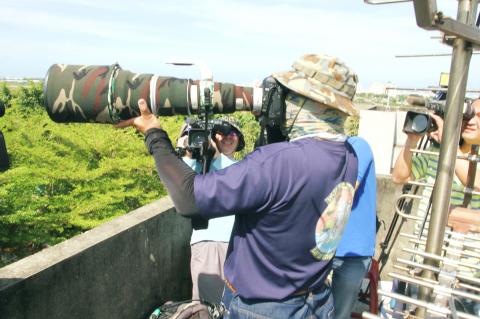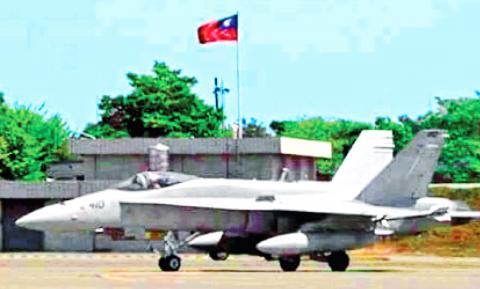A US C-130 transport plane arrived at the Tainan Air Force Base from a US Marine Corps base in Japan yesterday evening, carrying service crew to repair one of the two US F/A-18 jets that made an emergency landing in Tainan on Wednesday.
The repair crew arrived just hours after Chinese Ministry of Foreign Affairs spokeswoman Hua Chunying (華春瑩) told a regular news briefing in Beijing that China had made solemn representations to the US about the US jets landing in Taiwan.
“We demand that the US strictly abide by the one China policy and the three joint communiques between China and the US and to deal with the relevant issue prudently,” she said.

Photo: CNA
Earlier in the day, the two F/A-18s had been moved into hangars belonging to Air Asia Co (亞洲航空), which provides aircraft maintenance, repair and overhaul services at the Tainan Airport.
Meanwhile, US Department of Defense officials confirmed the two F/A-18 Hornets were from US Marine Fighter Attack Squadron 323 (VMFA-323), currently based at Marine Corp Air Station Iwakuni in Yamaguchi Prefecture, Japan.
They said the planes landed in Tainan as a precaution and there had been no injuries to the crew or damage to the aircraft.

Screen grab from the Internet
A statement by the US Marine Corps’ press office late on Wednesday said: “A persistent engine oil pressure warning light precipitated the precautionary emergency landing.”
It also said that the Tainan Airport is an US-approved divert airfield and that the jets had been en route to Singapore to participate in the “Commando Sling” exercise with the city-state’s air force.
However, according to a source in Washington, the F/A-18s were providing escort and protection for a reconnaissance mission by an EA-6B Prowler, a tactical jamming aircraft used by the US Navy and Marine Corps.
An EA-6B Prowler can carry out armed reconnaissance, electronic jamming operations and aerial surveillance tasks, and provides defense against anti-ship missiles.
The Washington source said that due to the sensitivity of its mission, the EA-6B did not land in Tainan with its escort jets, but returned to its base in Japan.
The source said the escort mission took the F/A-18s and the EA-6B on a route along the air defense identification zone over the waters off the east coast of Taiwan and it was headed to either Singapore or the Philippines.
American Institute in Taiwan (AIT) spokesman Mark Zimmer said the US C-130 transport plane, carrying US maintenance personnel and aircraft parts, landed at 8:34pm.
The maintenance crew then headed straight to the hangars to begin repair work.
An AIT team has been sent to Tainan to provide assistance, Zimmer said.
It was not immediately clear how long it would take to repair the aircraft.
A Republic of China Air Force official said the US maintenance crew was expected to stay overnight to carry out the repairs.
The F/A-18s will depart Taiwan as soon as the repairs are completed and the aircraft pass safety tests, the official added.
Air Asia is now owned by Aerospace Corp (台翔航太), but during the Cold War it was an aircraft service unit for Air America, which was created by the CIA for covert operations in East Asia and Southeast Asia.
The company is certified for maintenance and servicing of various aircraft and has links with the US aviation industry, and its location renders the Tainan Airport a US-approved divert air field.
Additional reporting by CNA

CHAOS: Iranians took to the streets playing celebratory music after reports of Khamenei’s death on Saturday, while mourners also gathered in Tehran yesterday Iranian Supreme Leader Ayatollah Ali Khamenei was killed in a major attack on Iran launched by Israel and the US, throwing the future of the Islamic republic into doubt and raising the risk of regional instability. Iranian state television and the state-run IRNA news agency announced the 86-year-old’s death early yesterday. US President Donald Trump said it gave Iranians their “greatest chance” to “take back” their country. The announcements came after a joint US and Israeli aerial bombardment that targeted Iranian military and governmental sites. Trump said the “heavy and pinpoint bombing” would continue through the week or as long

TRUST: The KMT said it respected the US’ timing and considerations, and hoped it would continue to honor its commitments to helping Taiwan bolster its defenses and deterrence US President Donald Trump is delaying a multibillion-dollar arms sale to Taiwan to ensure his visit to Beijing is successful, a New York Times report said. The weapons sales package has stalled in the US Department of State, the report said, citing US officials it did not identify. The White House has told agencies not to push forward ahead of Trump’s meeting with Chinese President Xi Jinping (習近平), it said. The two last month held a phone call to discuss trade and geopolitical flashpoints ahead of the summit. Xi raised the Taiwan issue and urged the US to handle arms sales to

State-run CPC Corp, Taiwan (CPC, 台灣中油) yesterday said that it had confirmed on Saturday night with its liquefied natural gas (LNG) and crude oil suppliers that shipments are proceeding as scheduled and that domestic supplies remain unaffected. The CPC yesterday announced the gasoline and diesel prices will rise by NT$0.2 and NT$0.4 per liter, respectively, starting Monday, citing Middle East tensions and blizzards in the eastern United States. CPC also iterated it has been reducing the proportion of crude oil imports from the Middle East and diversifying its supply sources in the past few years in response to geopolitical risks, expanding

An Emirates flight from Dubai arrived at Taiwan Taoyuan International Airport yesterday afternoon, the first service of the airline since the US and Israel launched strikes against Iran on Saturday. Flight EK366 took off from the United Arab Emirates (UAE) at 3:51am yesterday and landed at 4:02pm before taxiing to the airport’s D6 gate at Terminal 2 at 4:08pm, data from the airport and FlightAware, a global flight tracking site, showed. Of the 501 passengers on the flight, 275 were Taiwanese, including 96 group tour travelers, the data showed. Tourism Administration Deputy Director-General Huang He-ting (黃荷婷) greeted Taiwanese passengers at the airport and